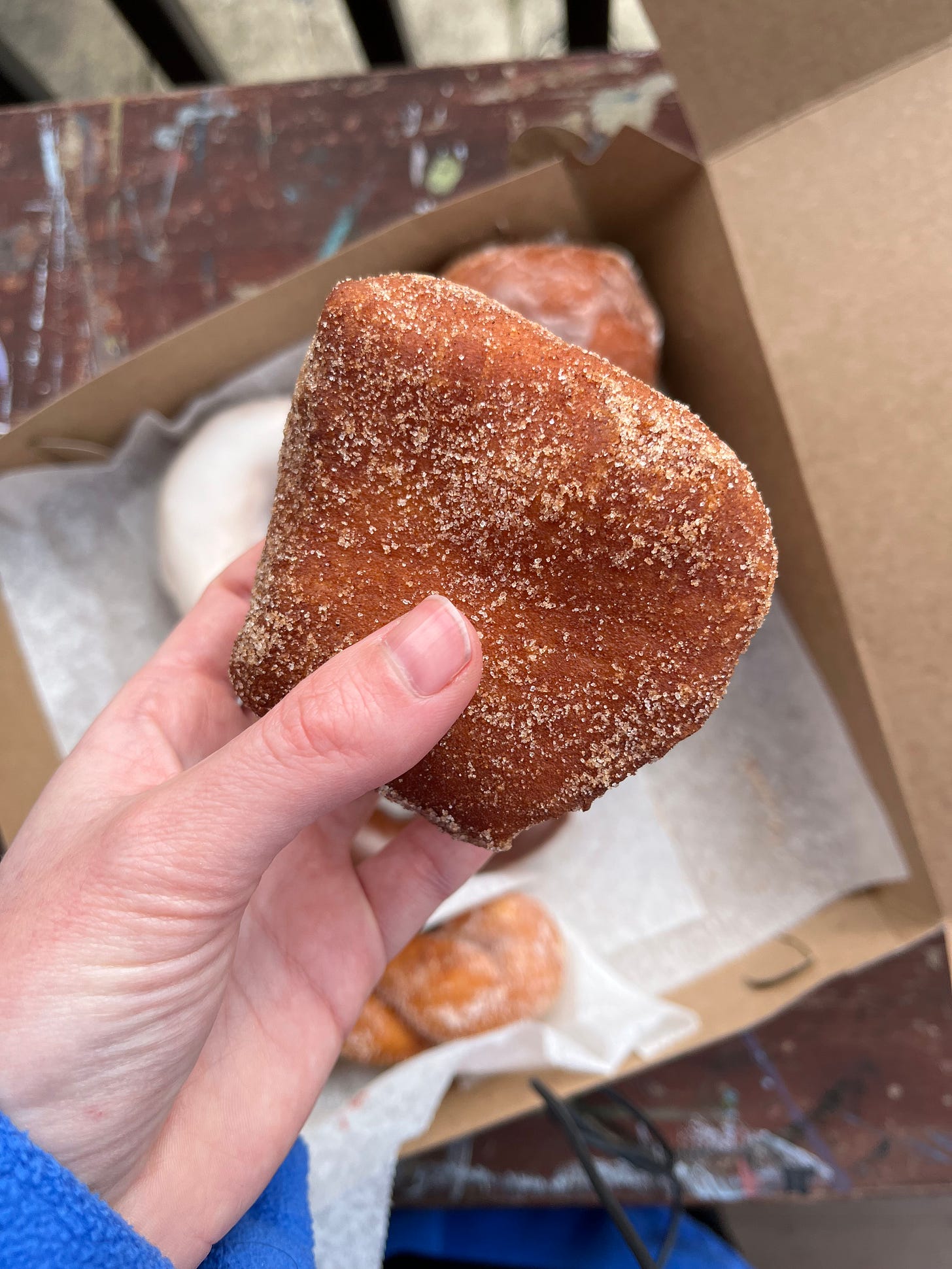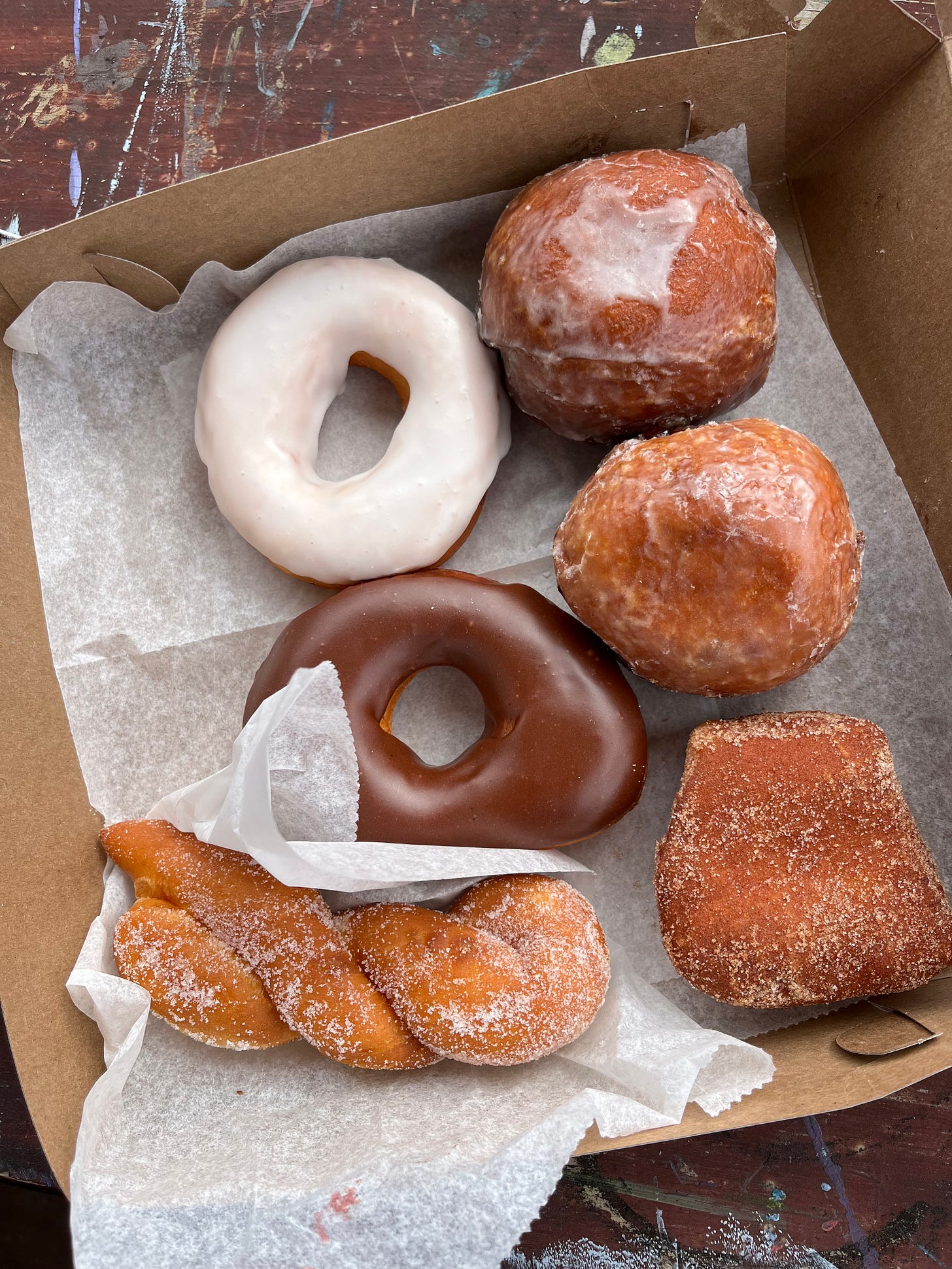I tried to be smart about Lent as a kid. I’d suggest giving up bananas, a food that I hate to this day and never ate anyway. Giving up bananas would have no impact on my life, which is just what I wanted.
As I’ve gotten older and expanded beyond my mostly-catholic-small-town bubble, Lent has started to seem strange to me. It is so personalized. The only thing agreed upon is no meat on Fridays. But fish and cheese are fine? Under lenten rules, vegans, vegetarians, even pescatarians don’t even have to try.
Jesus died on a Friday, so the concept of fasting on Fridays makes sense. According to a 2012 article on NPR, the thought process is that warm blooded animals are off limits, while cold blooded animals are fine. That’s because when we eat warm blooded animals, they have essentially sacrificed their lives to us, just like Jesus. I think this is a beautiful thing to consider, although I still don’t understand why cold blooded animals don’t count.
For most of history, of course, these rules only applied to the rich (considering the poor often couldn’t afford meat anyway) and were actually in effect all year long. As a middle class formed, this sort of fasting became standard. It wasn’t until recent years that the practice of meat-free Fridays was confined to the 40 days of Lent.1
What is Lent?
Lent was created at the Council of Nicaea in 325 AD, which was a meeting of bishops to try and create consensus in the church. In its earliest form, Lent was a time for full on fasting during the 40 days prior to Easter. Participants ate one meal a day after 3 PM that could not contain meat, fish or dairy. Other rules varied from Church to Church— for example, some congregations could eat normally on Sundays while others couldn’t.2
By the 1400s, Christians began eating earlier in the day and, maybe having smaller, second meal later on to make sure they had energy for work.
In 1966, the Catholic Church reduced fasting days to Ash Wednesday and Good Friday, although fasting all 40 days was still “strongly recommended.” Eventually this evolved into the Lent we know today.
The thing I just learned about Christianity is that fasting is certainly promoted in the Bible, but there are no instructions on how and when to do it. That’s probably why the rules of Lent are so fluid. It differs from place to place and person to person. In India and Pakistan, some Christians fast during Lent like Muslims during Ramadan: every day from dawn to dusk.3 For me and countless other New Jerseyans, Lent is all about eating meat-free pizza on Fridays and giving one thing up. Some people don’t believe in fasting at all. Some people choose to add something in instead, like daily prayer.
Fat Tuesday
Fat Tuesday is the prelude to Lent. Traditionally, it is the time to eat all your eggs, lard, sugar, dairy and meat before you give them up. It's roots are in pagan celebrations of Spring and fertility.
When Christianity came to Rome, whoever was in charge decided that rather than abolishing old customs, they would incorporate them into the new ones. Carnival4 and Mardi Gras are big, drawn out Fat Tuesday celebrations; periods of time to let loose to the extreme before a solemn month and a half of fasting and reflection.5
In the Philadelphia area today, a lot of people just eat donuts. Especially special donuts, like fasnachts and paczki.
Fasnacht donuts are a German creation, and they are different from other donuts because they are denser, square or triangle shaped, and don’t have a hole in the middle. The word Fasnacht essentially translates to fast-night, and is used to signify the day before lent. Fasnacht day is a part of Pennsylvania Dutch tradition. 6
Paczki are Polish. They are made of an especially rich, fluffy dough and filled with fruit or cream. The donut pictured below has golden raisins in the dough and a berry jam filling.
In both cases, the making of these donuts was a way to use up excess eggs, butter and sugar before fasting began. Although many people don’t fast in the same way now, they eat the same donuts as a way to honor the tradition.
I am not a currently a practicing Catholic, and I have never really fasted, unless you count intermittent fasting for “health purposes.” As a lover of food though, and a lover of Fat Tuesday, I can’t help but be intrigued by it. I am beyond my days of trickery and abstaining from bananas. I think I am going to give up something for lent this year for real.
When I think of fasting, I remember that food is special. Sacred, even. If you really think about it: every day we must consume parts of the natural world for our survival. The Earth not only nurtures us: it sustains us. It is a part of us. The Earth is constantly giving parts of itself up for us. We all have to eat.
The choice to eat or not eat even when food is readily available seems distinctly human to me. But that choice has grown in problematic ways as diet culture has taken a hold on us. Giving up sweets and eating less have become everyday acts in the pursuit of weight-loss as opposed to ways to connect with God. For many, food is so abundantly available that it’s hard to remember how special it is.
As Lent begins and Ramadan creeps up on us, I am reminded of how deeply connected people are to food, how strong people are, and and how much of a joy food can be. With fasting comes a celebration of abundance and gratitude. The two go hand in hand.
Whether you choose to fast this year or not, I hope you eat a lot of donuts today with no remorse.
Happy Fat Tuesday ;)
P.S. If you would like to share any of your experiences relating to Lent, Fat Tuesday or fasting in general, I’d love to hear about them. Please shoot me an email at frankieparker0@gmail.com. Thanks for reading!
https://kofc5357.org/2019/03/15/how-did-the-roman-catholic-tradition-of-eating-fish-on-fridays-begin/
https://groundworkonline.com/blog/a-short-version-of-the-long-history-of-lent
https://www.ucanews.com/story-archive/?post_name=/2002/02/27/some-christians-observe-lenten-fast-the-islamic-way&post_id=20178
carnelevarium - to take away or remove meat
https://www.history.com/topics/holidays/mardi-gras
https://www.skh.com/thedish/fasnacht-day/







Love love this! Especially about the philly donuts :) Never had Paczki before. My favorite part:
"The choice to eat or not eat even when food is readily available seems distinctly human to me. But that choice has grown in problematic ways as diet culture has taken a hold on us. Giving up sweets and eating less have become everyday acts in the pursuit of weight-loss as opposed to ways to connect with God. For many, food is so abundantly available that it’s hard to remember how special it is."
I do not fast in part because I don't want to participate in diet culture. I have recently completed a month of sobriety and I definitely felt "closer to God" in that felt more connected to myself and thus more spiritually open. For me it is better to appreciate how special food is by eating local, composting, eating food from my garden, etc.
Thanks for this reminder Frankie :)